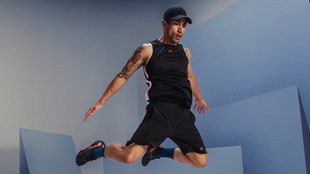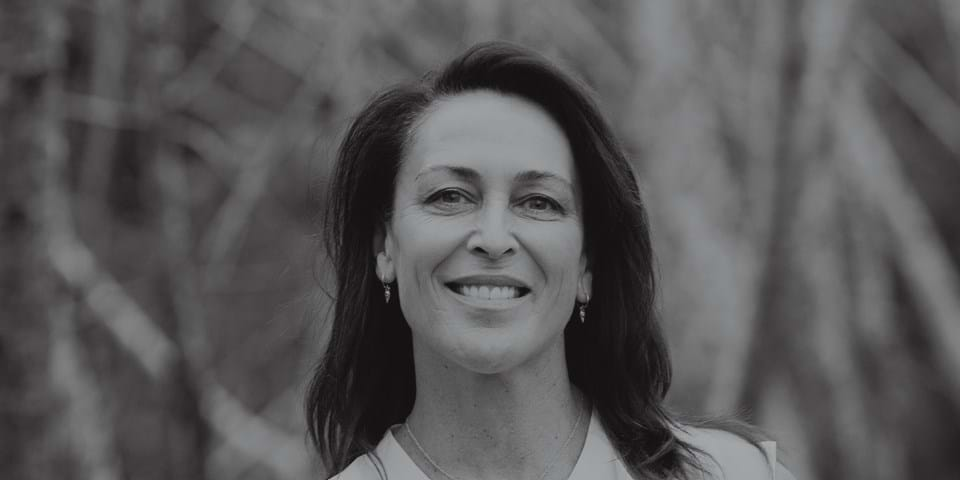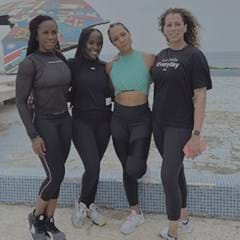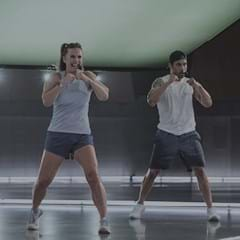Sarah Shortt (SS): Hi Vili. I know the Q1’22 filming was incredibly stressful with New Zealand being in lockdown. How did you cope with the challenge of filming amidst that uncertainty?
Vili Fifita (VF): Yeah, it was tough, but I do feel like I know how to prepare myself for anything. I put that down to knowing my purpose in life: to be a solid father and the number one provider for my daughter, Piper, no matter the situation.
I was 17 when I found out that Khiran [Huston, Vili’s wife] was pregnant. It was pretty shocking news! When people found out, I was called every bad name under the sun. I was told that my life was over, that I was nothing. I literally had family screaming at me I wasn’t going to amount to anything. Almost immediately everyone who was supposed to be a “friend” left me.
I was so stressed out and just didn’t know what to do. I had zero support. At that age, teenagers are meant to be enjoying high school – especially those preparing for college – but I learned very quickly that I had to cut off all my emotions and find a job, any job, so I could provide for my baby. She was the only reason I was able to move forward. She and Khiran were the only humans on my mind.
My parents weren’t happy because I was supposed to be the rugby star. I’d played the sport from the age of five and had the talent and the passion to make it because my whole entire family lived, played and breathed rugby. My Dad had come from Tonga to New Zealand on a contract to play rugby, and met my Mum through my grandfather, who was the chairman of a rugby club in Auckland. I owe my strong work ethic to my Dad.
After I became a father, nobody believed in me. Everybody doubted me and no one thought I was going to be a good dad, to be able to provide for my daughter. Having people look down on me, saying: “You’re a loser, you’re going to be nothing” is where a lot of my drive to succeed came from.
SS: How was your dad during that difficult time?
VF: When he found out about the pregnancy, I was scared he was going to kill me! Honestly, I was mentally and physically preparing myself, like: okay, first he’s going to smack me for upsetting our family. Then he’s going to repeat those smacks with a wooden stick but about ten times harder for making Khiran’s family upset, hahaha! Man was I wrong: he just spoke in a soft, calm tone and said: “OK you think you’re a big man, you think you can raise another human being at your age? GOOD LUCK.” Then he just walked away. Honestly, it hurt like hell. I wished I’d got the beating instead.
He gave me a week to reflect, and then asked me how I felt. I replied: "I've got a massive responsibility to fulfil, so I need to get a job." He just nodded with a smirk. Soon after that, he introduced me to mechanical engineering, which was his profession alongside coaching top-level rugby. It was a fresh start for me, along with discovering the gym and bodybuilding.
Unfortunately, Dad passed away before Piper's first birthday. I know he was there in spirit though. I'm super grateful for the life lessons he taught me about self-reliance and independence.
What was it like when the Piper was born?
It was tough. At that age, the baby doesn’t care how old you are. It just wants to be fed and have its nappies changed. I learned from an early age that nobody was coming to save me. I couldn’t just go: “Hey friends, hey family – can you look after my baby until I get my life together?” So, what did I do? I had to back myself and own it.
When people find out you’re a kid and you’re going to have a baby, everybody starts looking down on you. I couldn’t even walk down the street without getting mocked. After I became a father, nobody believed in me. Everybody doubted me and no one thought I was going to be a good dad, to be able to provide for my daughter. Having people look down on me, saying: “You’re a loser, you’re going to be nothing” is where a lot of my drive to succeed came from. It gave birth to a confidence I didn’t know I had and helped me become the ultimate version of myself. That’s why I don’t rely on anyone else, even today.
You want to hear something funny though? Fast forward 16 years and A LOT of the people that used to mock me now want me to train them. People that used to look at me like I was nothing, now their wives come to my class. Men that used to look the other way when I walked down the street now ask me, “How I strengthen my core like yours? How do I get arms like you? How do I become healthier?” I don’t hold onto grudges but sometimes I’m just like, damn, it’s funny how things work out.
So that’s why, even though rehearsing and filming those releases during lockdown was physically and mentally challenging, I knew I could handle it – because of what I’ve already survived in the past.
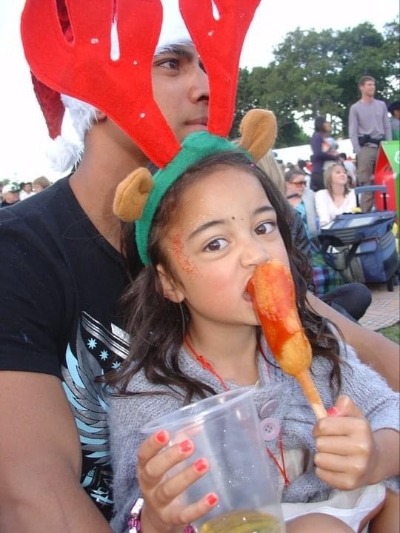
SS: You recently became a Les Mills Ambassador. You've had phenomenal success in group fitness, what do you see as the key to being a great Instructor?
VF: You need to know why you want to teach. I do it because I know every time I turn up, someone's relying on me to give them a workout. You've got to be dedicated to turning it up every time, and you also have to love to give.
I just love teaching people. I love seeing them do things they never thought they were capable of: lift this weight or perform that move. I want them to be successful, especially those people who are really nervous and shy – the ones who start in the back row because they don’t want to be seen. Gradually you see them getting more confident and moving closer to the front, and then before you know it they’re requesting tracks and are in the front row. I like building their self-belief through group fitness.
It’s a choice to teach. For me, it's never been about money or trying to be famous. It's not about being the fittest person in the room (unless it’s a competition, haha!). I’ve chosen to dedicate a certain amount of hours per week to these people and I don't expect anything in return. You have to be able to give freely.
At its core, it’s about loving whatever fitness program you’re teaching, and being very, very present with who you are. Be yourself. That's far more valuable than trying to imitate what you think someone else brings to the table.
SS: You teach many classes at Les Mills Auckland City. Why do you think that people keep coming back to your workouts?
VF: I think they love that I'm comfortable with them; that I know who I am, and I don't sugar-coat anything. If you come to my class, I get straight to the point. No matter what kind of day I’ve had, I never give anything less than a hundred and ten percent. I love training with people, and it doesn’t matter the number: I would give the same energy and love to five people as I would to a thousand. I don't turn it up for 100 people and turn it down for five. I give the same amount of energy regardless who's in the room. It's about respecting those who have dedicated their time to be with you.
I want everyone to be successful, especially those people who are really nervous and shy – the ones who start in the back row because they don’t want to be seen. Gradually you see them getting more confident and moving closer to the front, and then before you know it they’re requesting tracks and are in the front row. I like building their self-belief through group fitness.
SS: For Instructors out there who want to keep developing their skills, what’s your best advice?
VF: You need to be open to receiving feedback. And also – take it slow. Don't rush the process. Don’t try to be perfect. The way I do it is by re-evaluating myself every year to see where my overall game’s at. I assess all the things that I need to work on – and there's always something to work on: mobility, speed, coaching, dialling things up or down… the list goes on.
Of course, being open to the feedback is the first thing, but you also have to know how to apply it. Once the feedback has been received, it’s up to you to internalize it and figure out how to make the progression. You need to be real with yourself, check yourself, and be ok with failing and learning new lessons.
I always want to learn; I feel like a student every day. I love listening to masters in their field, just absorbing the knowledge like a sponge. Any time I get to spend time with Dan and Rach, they know I won’t say much because I’m just concentrating on absorbing the new information. And then I’ll try to apply it in my teaching – just little bits, while also being true to myself. It's challenging sometimes, but always fun.
It's been awesome filming on a regular basis, so I can see how I’m improving every quarter. I always want to do better and as long as I'm doing this, I always will get better.
Here's one example: after every filming, Khiran and I sit on the couch with Piper between us, and we watch the first version of the Masterclasses that Khiran and I have filmed. If we’re watching BODYCOMBAT first, then Piper and Khiran give me feedback. Honestly, they’ll start hitting me straight away, like bang, bang, bang, bang, bang! “You need to do this, don’t do that…” After my turn I’ll be like, cool I’ll take that feedback and put it to the side. Some of it's personal and I might be like, “That’s got nothing to do with the program, but OK fine…” Then it’s Khiran’s turn and Piper and I unload on her. Our daughter is our biggest critic. Sometimes she goes silent and that’s when I know she likes it. But then sometimes she’s like, “Why are you doing this? And this and this, Dad?” She's honestly my biggest critic… it can be brutal!
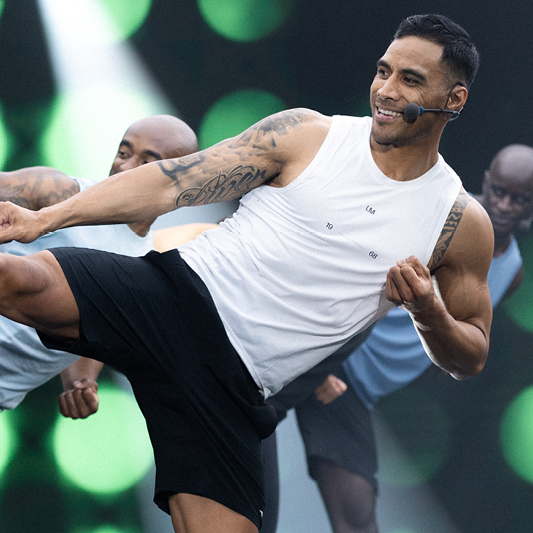
SS: In recent releases you've been filming teaching directly to camera, rather than to an audience. What's that been like?
VF: I call it hard fun! All you can see is this little lens, so when I'm talking to it, I'm trying to imagine hundreds of thousands of people behind the camera.
When we filmed BODYCOMBAT 90, the director told me to look at the little blinking light – the orange sticker in the corner. So, I while was saying out loud "Hey, welcome to BODYCOMBAT!" in my head I was going, "What orange sticker? Am I even looking in the right place?" When I watched it back, I could see I was actually looking slightly off camera.
I'm getting better at it though. Now I tell myself that little light is my best friend. I'm getting pretty good at following the light and being able to teach to it at the same time, because I know there are millions of people behind that little lens.
Our daughter is our biggest critic. Sometimes she goes silent and that’s when I know she likes it, but then sometimes she’s like, why are you doing this, and this and this, Dad? She's honestly my biggest critic… it can be brutal!
SS: And what’s been the biggest challenge for you over the past few years?
VF: Learning to be patient. I'm not naturally a patient person, but over the last two years, I've become a lot calmer, a lot more observant. I think before I speak a lot more. But the biggest one is being patient. Patience has helped me calm down and it’s allowed my brain to expand to another level.
I used to be so impatient; I wanted everything right now. Eventually I realised that it wasn't helping me, because I’d get frustrated if things didn't go according to plan and I wasn't good at pivoting. If I'd trained for something and it didn’t happen, I’d get really annoyed.
I started to think a lot more about what I was doing: how I wanted to show up, how I wanted to teach, perform, carry myself…. And what I found was that once I slowed down and stopped expecting everything go a certain way – things felt much calmer. You know, the pandemic arrived, we had all these lockdowns, but I’ve been able to cope with the uncertainty in a way that I couldn’t have done five years ago.
I’ve also recently dialled up my mobility work. I stretch every day and I’ve really fallen in love with the power of silence: just holding a position helps to calm my mind.
SS: If you could give some advice to your 17-year-old self, what would you say?
VF: Everything is going to be OK. You can achieve more than you think you can. I’d tell him, you can do everything by yourself. You don't need anyone else. Trust and believe in yourself.
I'd say that Piper is going to be super independent, smart, confident and strong. She's going to be a light in the world. Because she is.
And also: be patient, because you don’t need everything to happen right now. Good things take time.

Vili Fifita is a LES MILLS TONE™, BODYCOMBAT, BODYPUMP™, LES MILLS CEREMONY™, LES MILLS CONQUER™ Instructor, a LES MILLS SPRINT™ Coach and a LES MILLS GRIT™ Trainer/ Presenter. He lives in Auckland, New Zealand. Follow Vili on Instagram



